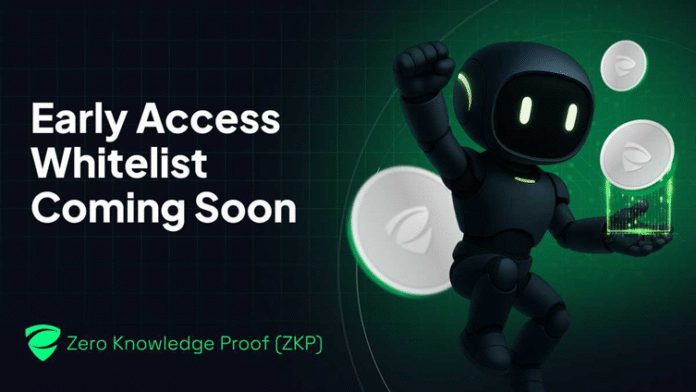Most crypto projects start as tinkering grounds — networks that catch the attention of hobbyists long before businesses take them seriously. But the next leap in blockchain isn’t coming from another meme or sidechain experiment; it’s being engineered for boardrooms, institutions, and public infrastructure.
Zero Knowledge Proof (ZKP) is setting out to become that leap — a Layer-1 built for private, scalable, enterprise-grade operations. It’s where cryptographic rigor meets real-world functionality. Before the institutions and corporates begin integrating it, ZKP’s whitelist is opening soon, giving everyday investors a chance to enter a network designed for the same scale and trust that global industries depend on.
1. From Hobbyist Chains to Institutional Foundations
Most blockchains were built by communities chasing ideals, not enterprises chasing compliance. Privacy came as an afterthought. Scalability was patched later. What’s unfolding with Zero Knowledge Proof (ZKP) is the reverse: a system architected from day one to serve enterprises that require airtight privacy, seamless throughput, and transparent accountability.
This means ZKP isn’t just another decentralized playground — it’s a framework capable of handling industrial-level operations. Consider:
- Banks settling trades where counterparties can verify execution without revealing client portfolios.
- Hospitals validating treatment authorizations without exposing patient data.
- Governments issuing digital IDs or land records while keeping citizen details confidential.
The shift from retail experimentation to institutional integration defines ZKP’s purpose. It marks the maturing of crypto — where privacy proofs evolve from coding experiments into mechanisms that protect billions of real-world interactions.
2. The Architecture: zk-SNARKs + zk-STARKs Working in Tandem
ZKP’s architecture fuses zk-SNARKs and zk-STARKs — two proof systems with distinct advantages. zk-SNARKs provide compact proofs for quick transaction validation, perfect for financial use cases. zk-STARKs, meanwhile, deliver transparency and quantum resistance, vital for large-scale institutional computations.
Together, they enable a blockchain capable of running at both retail speed and enterprise depth. Proofs can confirm the accuracy of a trade, computation, or message without showing the data itself — a vital property for regulated industries.
The combination extends to how ZKP handles throughput:
- zk-Rollups compress thousands of transactions into one verified proof.
- Recursive proofs verify other proofs, stacking efficiency exponentially.
- Parallel computation scales throughput without centralizing the network.
In practical terms, this means financial institutions could run complex operations — settlements, audits, reconciliations — directly on a public network without leaking sensitive information.
3. Enterprise-Ready Design: Privacy, Scale, and Compliance
ZKP isn’t positioning itself as an anti-system network. Its design allows regulated players to participate securely. Selective disclosure lets users or institutions reveal specific details for compliance audits without opening entire transaction histories. Shielded smart contracts make it possible for decentralized apps to execute private logic, keeping proprietary data hidden.
For enterprises, these aren’t optional features — they’re prerequisites. A supply chain company can prove the authenticity of goods without revealing trade secrets. A multinational can demonstrate environmental compliance without publishing internal figures. A health consortium can run shared databases where data is verifiable but never visible.
By focusing on modular upgrades and a governance-driven treasury, ZKP gives both developers and corporations a flexible base to build upon. It’s less about speculation and more about infrastructure — a blockchain that scales with regulation, not against it.
4. The Whitelist: Retail’s Early Window into an Institutional Future
In crypto’s usual story, corporates arrive late — long after early adopters have extracted most of the upside. With Zero Knowledge Proof (ZKP), that timeline flips. The whitelist is opening soon, and it’s retail investors who will step in before enterprise integration begins.
This phase gives early participants access at entry-level pricing, ahead of what’s likely to be institutional onboarding. Once banks, data providers, and governments begin running their own private verifiers on the ZKP mainnet, entry will tighten.
For now, the network is at its formative stage —
- The developer SDK is public.
- zk-Rollup integrations are live in testnet.
- Partnerships in finance, health, and public infrastructure are in exploratory talks.
For individuals seeking the best new crypto to buy, this isn’t a meme race or a social token trend. It’s a chance to participate early in a system being built for enterprises — the very users who will define blockchain’s mainstream decade.
Conclusion
Zero Knowledge Proof (ZKP) signals the shift from blockchain as hobby tech to blockchain as national infrastructure. Its dual focus on privacy and scalability, institutional compatibility, and real-world compliance gives it a distinct edge over patchwork ecosystems. The whitelist opening soon isn’t just another token event — it’s an inflection point where retail can claim early access to a network that corporations will eventually depend on. For investors, it represents entry into the foundational layer of enterprise blockchain — a network where cryptography, computation, and credibility finally align. Before the institutions move in, ZKP offers a front-row seat to that transformation.
Disclaimer: LiveBitcoinNews does not endorse any content on this page. The content depicted in this Press Release does not represent any investment advice. LiveBitcoinNews recommends our readers to make decisions based on their own research. LiveBitcoinNews is not accountable for any damage or loss related to content, products, or services stated in this Press Release.





